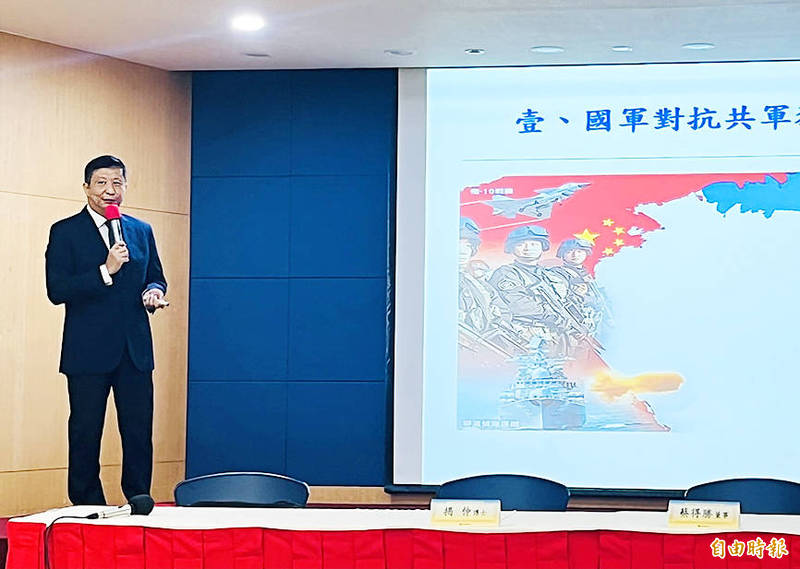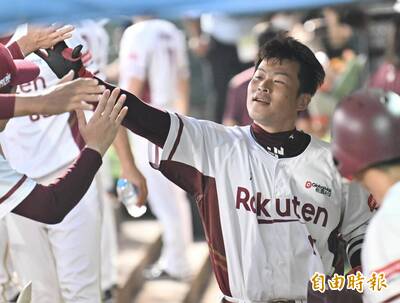《TAIPEI TIMES》 Han Kuang needs to be more comprehensive: expert

National Policy Foundation associate researcher Chieh Chung speaks at a forum in Taipei on March 30 last year. Photo: Chen Yu-fu, Taipei Times
By Wu Che-yu and Jake Chung / Staff reporter, with staff writer
The Han Kuang exercises this year highlight the Ministry of National Defense’s dedication to enhancing the “realness” of the exercises, but the annual war game could better serve the military by finding and resolving existing issues, experts said on Tuesday.
The live-fire component of this year’s Han Kuang military exercises started early on Monday. The annual exercises, which have been Taiwan’s major war games since 1984, consist of live-fire drills and computerized war games to test the nation’s combat readiness in the face of a possible Chinese invasion.
Chieh Chung (揭仲), an associate research fellow at the National Policy Foundation in Taipei, said on Tuesday that while the stages of a war are aptly illustrated during Han Kuang exercises, war is not only a matter for the military as it also greatly affects civilians.
The Wanan air defense exercise and the Tung Hsin logistics and mobilization drills should be stepped up or made a part of the Han Kuang drills, he said.
While this year’s Wanan drills had made arrangements regarding facilities that would shelter people affected by air raids, Chieh said such facilities’ food and other goods would need constant maintenance by local governments.
Chieh said that the use of such facilities would require early planning by the ministry.
The ministry did well for emphasizing logistics and implementing forward deployment with preposition depots, Chieh said, adding that during the actual exercise he did not see munitions depots or medical stations in tactical positions near the troops.
The ministry used to collaborate with established partners, such as Champion Auto Co, in the handling of forward-deployed repair stations, and use these partners’ factories for makeshift repair stations, he said.
Combat zones are complicated, and the ministry should set up collaborations with other automakers, he said.
The army’s use of rotary drones was positive, but the military should also consider plans to draft civilian drones, considering the growing use of drones both in the Ukraine war and by the Chinese People’s Liberation Army (PLA) for various purposes, such as logistics, he said, adding that he hoped such plans would be enacted by next year’s Han Kuang exercises.
The military’s enacting a scenario on repelling an enemy offensive attempting to seize Taiwan Taoyuan International Airport via air-dropping was the first time such a scenario has been run, and it was unfortunate that the airport administration had denied the military’s request to use the airport for three hours as they thought the exercises would affect the flight schedule negatively and tanks could damage the tarmac, he said.
The ministry could negotiate with the airport half a year in advance or even earlier so that it can divert some flights to Taipei International Airport (Songshan airport), Chieh said.
It was unfortunate that the military had to cancel the exercises at the Taitung Airport due to the incoming Typhoon Doksuri, he said.
Former F-16 pilot trainer Huang Yang-te (黃揚德) said that Taitung Airport, in addition to providing emergency takeoffs and landing for aircraft, could also function as a munitions depot.
The munitions resupply drills and runway maintenance drills should go forward as planned, he said.
The military’s conversion of several roads and taxi strips at airports into airstrips for the military provided greater resilience for the air force and it helped thin the enemy’s air forces, Chieh said.
He said the most lackluster part of this year’s exercise was the disparity in force commitment and the overall strategy.
Since the implementation of changes to the reservist forces, the ministry has vastly changed its strategy from “killing the enemy on the beaches” to implementing a “deep defense” concept including the beaches, a separate zone between the beaches and the main cities, the urban defense grid and, if necessary, using the original logistics depots as defenses, he said.
However, the exercises still put the joint-force units on the beaches instead of using the urban landscape to conduct urban warfare, leading to combat between the landing enemy and the defending forces, he said.
This fails to reflect the military’s goal to preserve combat capabilities and runs the risk of the entire defense plans collapsing upon losing the ground battle, Chieh said.
新聞來源:TAIPEI TIMES
















